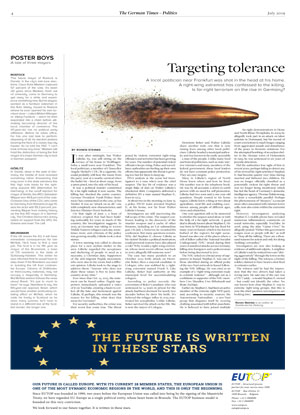A tale of three mayors
ROSTOCK
The future mayor of Rostock is Danish. In the city’s mid-June elections, Claus Ruhe Madsen captured 57 percent of the vote. It’s been 20 years since Madsen, fresh out of university, came to Germany to get away for a while and experience something new. But he stayed, worked as a furniture salesman in the Ruhr Valley, moved to Rostock where he soon opened his own furniture store – called Möbel Wikinger, or Viking Furniture – which he then expanded into a chain before ultimately becoming director of the local chamber of commerce. The 47-year-old has no political party affiliation. Before he takes office, he has one last task to perform: disposing of all his election posters bearing the face of a classic big-city hipster. As he told the FAZ: “I can’t look at those any more.” Madsen will hold the distinction of being the first mayor of a major German city to lack a German passport.
GÖRLITZ
In Görlitz, deep in the east of Germany, the middle of June revealed something rather threatening that may loom in the state elections this fall: high vote totals for the rightwing populist AfD (Alternative for Germany). In the runoff election for mayor of Görlitz, the AfD’s Sebastian Wippel won 44.8 percent of the vote. Octavian Ursu of the CDU, who came to Germany from Romania at age 10, was the victor with 55.2 percent, preventing Wippel from making history as the first AfD mayor of a German city. The Christian Democrat’s victory relied on support from the SPD, the Greens and even The Left.
BRUNSMARK
If the UK leaves the EU, it will have immediate consequences for Iain McNab. He’ll have to find a new job. The Scot is in his 11th year as mayor of the Brunsmark, a town of 170 residents in the state of Schleswig-Holstein. This winter he was informed that he would have to step down if the Brexiteers succeed in isolating the UK from continental Europe. Citizens of Drittländer, or third-country nationals, may not occupy a mayoralty in Germany. But McNab seldom follows the news about Brexit. “It’s just to much to bear,” he says. Needless to say, the 69-year-old opposes Brexit, which would have another particularly irritating effect on McNab: when he visits his family in Scotland as he does every summer, he’ll have to stand in a different line at the Scottish border: the longer one.



